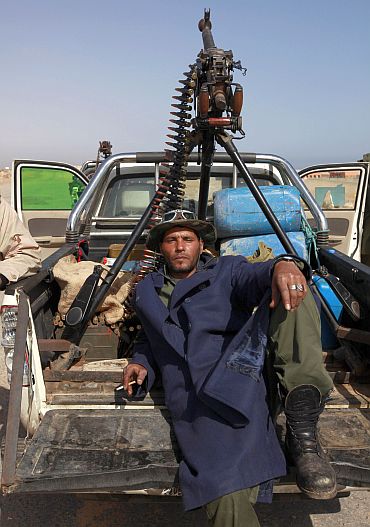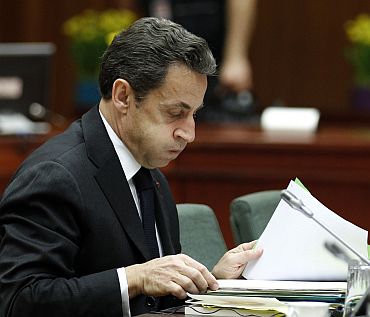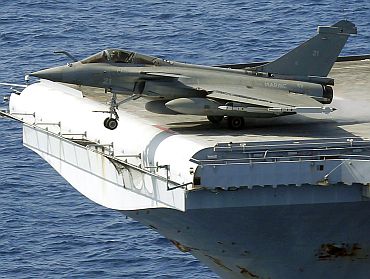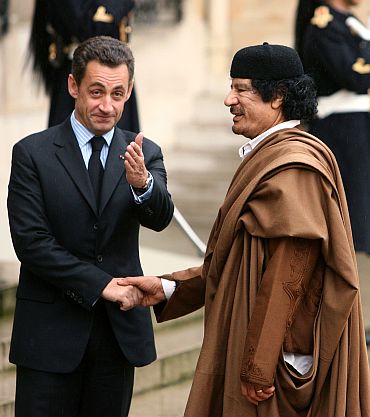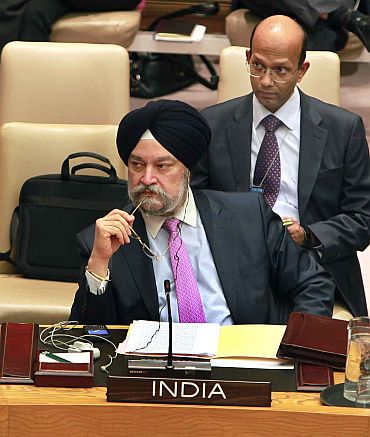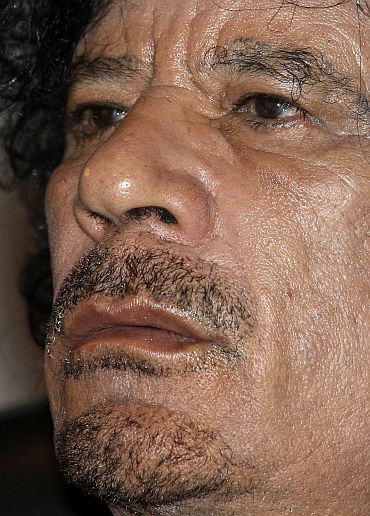 | « Back to article | Print this article |
'We are against Gaddafi's blind repression'
The French and allied forces, now under NATO command, launched aerial attacks to protect the people of Libya, as mandated by the United Nations, and to save those seeking political change from the 'blind repression' that Gaddafi has unleashed against them, France's Ambassador to India Jerome Bonnafont told Nilova Roy Chaudhury.
According to Bonnafont, the situation in Libya is unlike that of any other country in the region, because Gaddafi has threatened 'revenge with bloodbath' against all those seeking political change, whereas other leaders in the entire region have either offered political dialogue or, in some cases, even left on their own.
No other leader has met political opposition with an attempt to militarily crush them. The military intervention in Libya is not aimed at regime change nor, according to a Western diplomat, does it have anything to do with Libya's oil assets. It is intended to allow a legitimate political opposition to find a voice so that the people of Libya can choose their own leadership.
There is no evidence, Bonnafont says in this exclusive interview, that Al Qaeda is involved with the Libyan opposition National Integration Council. As the military campaign entered its ninth day on Sunday, Bonnafont declined to give a time frame for how long he thought the military action would last, but referred to a statement by French Foreign Minister Alain Juppe, who told media persons in Paris, 'The destruction of Gaddafi's military capacity is a matter of days or weeks, certainly not months.'
Please click on NEXT to read further...
'There is a wave for freedom and democracy'
The French government appears to have taken a lead and was the first to recognise the legitimacy of the forces opposed to Colonel Muammar Gaddafi's regime.
What was it about the leadership of the rebels that convinced your government that these forces as the actual representatives of the voice of the Libyan people?
There is a wave in all these countries; which is a wave for freedom and democracy, and in many countries there has been the beginning of a political dialogue or there has been a change, which has been peaceful.
We have seen in Libya that Gaddafi has sent his troops to crush the opposition; has threatened revenge with bloodbath; those are his words; has sent his tanks against the people in the cities his planes are bombing people in the cities and this is simply unacceptable both morally and in terms of what is called by the UN the 'responsibility to protect,' which is an international principle that has been adopted by the UN, according to which a government has a duty to protect its population and when it fails to do so, the international community has to come in.
You have seen that the Arab League has issued a statement in which they consider that Gaddafi is not any more legitimate; and that is in their own words; they say that Gaddafi is not any more legitimate, and the international community should establish a 'no-fly zone' and safe havens for civilians.
The Security Council has acted two times.
One, by resolution 1970, in which it has asked for the end of violence and it has threatened Gaddafi to be responding of his crimes in front of the International Criminal Court, and then it was not enough, and second on the basis of the Arab League request, the Security Council has adopted a resolution, which is establishing a no-fly zone, which is asking for the protection of civilians and which requests all states to take all necessary measures to implement these obligations.
'We accepted the rebels' legitimacy as interlocutors'
Blind repression?
Yes. You know that, after we passed (UNSCR) 1973, Gaddafi declared a ceasefire, but did not respect it. And the columns of tanks and planes were hurrying very quickly to Benghazi in order to crush the rebels. And so it was a matter of hours and our aerial action was able to stop these attacks and hence, to save thousands of lives.
And we continue now to develop this operation, avoiding as much as we can civilian casualties and targeting only military targets.
France is the only government that actually gave recognition to the rebel government. Why is it that France is the only country that gave legitimacy to the rebel group opposed to the Gaddafi regime, the so-called National Integration Council?
We accepted their legitimacy as interlocutors, who represent the search for an alternative to establish democracy in this country.
The fact is that when you have had so many decades without any normal political life, there are no organised groups as such, and you have to establish dialogue with people who decide that they are going to fight for a certain ideal and these people are those who claim 'we are going to press for change in our country so that we have democracy and pluralism'.
'The only thing that Gaddafi has promised to his people is to kill all the opponents'
And this is why we have decided to talk with them as people who are attempting to change the situation on the ground, since Gaddafi himself refuses any conversation with his people who are demanding it.
He has said all those opposed to him are terrorists and Al Qaeda.
And there is absolutely no evidence that they have any link with any terrorist or extremist movement, and on the contrary, they very clearly say that they are secular and that they want democracy.
Why, Ambassador, was Libya taken as this test case for both the UN Security Council and the Arab League, which sought a 'no-fly zone', whereas given what is happening in Yemen at the moment, where President Ali Abdullah
Saleh doesn't seem to be accepting anything and lots of killings are going on, Bahrain, where the GCC (Gulf Cooperation Council) and Saudi Arabia sent in forces.
What was so particularly special about Libya, to warrant your intervention?
It is very different. It's very different. In Yemen, the army is not involved. It was not involved until recently in the action. President Saleh has made several political offers that has been rejected by the Opposition. It's a very different picture.
In the case of Gaddafi, the only thing that he has promised his people is to kill all the opponents. That is the only thing he has said, answering his people's demands.
'Relationship with Gaddafi has changed depending on his behaviour'
So the situation is very different. To the best of my knowledge, the army in Bahrain has not been involved in controlling or non-controlling of demonstrations, and the Saudis have come at the request of the government of Bahrain and the GCC has an article which allows a government to call another government for help when it believes that it is necessary.
Those forces have not been involved as far as I know in maintaining order. They have been kept for protecting and security of sensitive areas. The position is very different.
You don't have a state of massive repression. There are worrying and disturbing events that we have condemned, but there is not the sort of massive repression and military attacks against opponents that is taking place in the case of Libya.
Isn't it a little ironic that until a few years ago Gaddafi was feted by Western governments and you had French presidents visiting Libya as recently as 2007.
Because there was a certain amount of opposition to him within the country and because he has not responded to calls for sense, is that the reason that there has been this hardening of postures?
The relationship with Gaddafi has changed, depending on Gaddafi's behaviour. You remember that after the Lockerbie attacks, there have been Security Council resolutions condemning Libya, and there has even been sanctions against Libya.
Then, after many years he has decided to fulfil his obligations. He has also offered positively give up his nuclear programmes and support to terrorism, so the situation changed. And then the process of normalisation of relations started.
Because we do not have a policy which is directed at a particular individual. We have policies that are designed in accordance to the behaviour of States and governments.
And then when Gaddafi has reacted the way he has reacted against his own people, it has been felt intolerable by his Arab brothers and the entire Arab community and people have demanded that the Security Council act.
Do not forget that there are over 800,000 foreigners still in Libya. 300,000 refugees have fled Libya because of his policies in the recent days. There are at least 300,000 to 350,000 Libyan refugees.
'We are trying to explain the reasons for our actions'
Have you been in communication with the Indian government? Has this become a point of conflict?
We have a permanent political dialogue with India, which included naturally exchanges of views on the situation, both in New York and in New Delhi.
Do you understand India's reason for abstaining and do they understand your reasons for enforcing this particular resolution?
India is a sovereign country, which makes its own decisions.
Naturally, now we are trying to explain, by different channels, the reasons of our analysis and the reasons for our actions. We underline the fact that one, this is within the very clearly defined international mandate in the United Nations Security Council, and two, it is on the sole ground of protecting civilians against the brutality of the regime.
We make sure that our air attacks never target civilians, but always military targets.
'We don't really need Gaddafi any more as a possibility for Libya'
The goal is to protect the population. And to make sure that Gaddafi is giving up attacks on his own population.
It's not to ensure a change of regime?
Nowhere, nowhere in the resolution is regime change mentioned. We are very attached in this sort of situation, very, very attached to respect international legality. And to act in accordance with the international laws.
The fact is that we don't really need Gaddafi any more as a possibility for Libya. But it is not up to us to decide for them.
It is up to the Libyans to decide and to be put in a position to freely decide on their political future. And this means that the government of Libya does not use its army to crush its opponents.
So we need to be sure that he will not any more attack his people. That is the goal of the operation.
Until when is the French government willing to continue the military action against the Gaddafi regime?
It is in his hands.
Has there been any attempt made to communicate with him through diplomatic channels?
Everything is with him now. There have been envoys from the African Union, there has been contacts with the Arab League, there has been several things taking place, there is a meeting in Addis Ababa, the UN Secretary General's special envoy. All these channels are there, it is up to Gaddafi to use them.
If he has a message to send. But the message we are waiting for and expecting from him is very simple. It is by his acts and not his declarations. He has declared two ceasefires and they were lies. They were not respected by him.
At the same time as he was declaring a ceasefire, his weapons were attacking his people. So it is really not a matter of statements, it is a matter of acts.
How long do you think the military action is likely to last?
The sooner the better. I can only direct you towards the statement by the French Minister of Foreign Affairs, Alain Juppe, who said, 'The destruction of Gaddafi's military capacity is a matter of days or weeks, certainly not months.'

